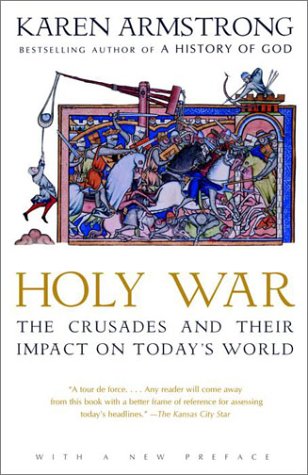
Holy War: The Crusades and Their Impact on Today’s Society
Holy War: The Crusades and Their Impact on Today’s Society
By Karen Armstrong (Published by anchor books, 1988. 628 pages)
This is a truly engrossing work. Ms. Armstrong tells of the Christian aggression toward the Muslims during the Crusades and after. The author expertly deals with the issues: how and why the Crusades began, why they were received with enthusiasm, and how these events forever altered the face of Europe and the Middle East. The animosity between these two religions, so horrifically illustrated every time we open a newspaper or listen to the news, is shown to have roots going back well over nine hundred years. Armstrong makes it abundantly clear that the current belligerence of Muslims, Jews, and Christians worldwide are merely modern extensions of these earlier campaigns.
Armstrong focuses initially on the common origins of the three religions, clearly describing the crucial factors leading up to armed conflict. In the next chapter, she brings the reader up to current events (current meaning 1988, when the book was initially published) in the Middle East. The third chapter returns us to the time of the Crusades. The author follows this pattern throughout the book, alternating between the Crusades and the present time.
In the hands of a less gifted writer, this technique might result in a rambling, confused account, with little continuity weaving it together. However from this reader’s perspective, following the traditional then-and-now method would have resulted in a far less riveting account. Only a historian of Armstrong’s caliber could pull this off.
Nonetheless, several issues must be raised. A former nun, Ms. Armstrong is to be commended for her impartial representation of the three religions. Unfortunately, her early indoctrination is apparent in several sections in the book, notably when she perpetuates the far-too-common myopic depiction of nonbelievers. While she makes the enlightened observation that religion has not been favorable to women, she is either unable or unwilling to visualize the intellectual and moral freedom of being a freethinker when she states “It is hard to live by the bleak light of the atheistic or agnostic day.”
Can the problems of today’s Middle East be resolved by exceptional skill and diplomacy, or is an all-out war between Islam and the West inevitable? Armstrong seems inclined toward the former, and all rational people would hope that she is right. What is needed for this to come to pass is objective, dedicated statesmen, statesmen who are philosophers and humanists, rather than religious fanatics and special-interest serving politicians. Is this ideal condition beyond our capabilities as a species? A secular solution to a nine hundred year old problem is the only viable option. “Holy Wars” main fault is that, although the solution screams out from every page, Armstrong fails to understand this most salient point.
If humanity is to relieve itself of the burdens and dangers of fundamentalist religion and make our world safer and saner, the training must begin in our schools and must focus on the principles of logic and sound reasoning, precisely the things the Christian right-wing objects to. This must extend outward from the schools until it affects the very infrastructure of society. It is to be hoped that this approach would be global in scope. Only then will the human race rise above the tribalism of the medieval world and, more to the point, of our own time.
Categories: Book Reviews
